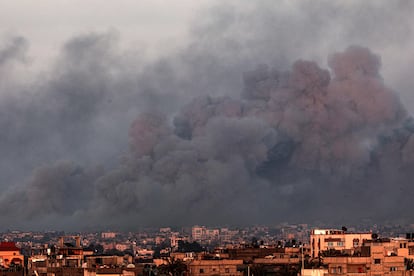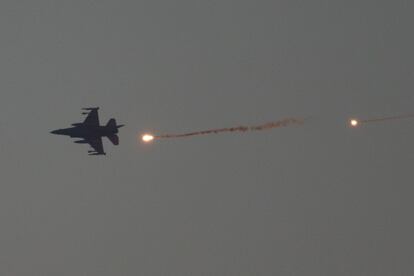Israel launches large-scale attack on Gaza after announcing end of operations in south
The EU has included Hamas political leader Yahya Sinwar on its terrorist list, while the US launched a third attack on Houthi targets in Yemen

On Tuesday, the Israeli army launched one of its largest attacks in Gaza since the beginning of the year, when it reported an end to military activity in the north of the enclave. A few hours before the attack, Defense Minister Yoav Gallant had announced that military actions in the center and south of Gaza would also be coming to an end. At the start of the invasion, on October 27, the retired IDF general said that Israel would end operations in Gaza within three months — a deadline that has now arrived. However, Israeli Prime Minister Benjamin Netanyahu — who has linked his political survival to a total victory against Hamas — believes that the conflict could go on for “several more months.” In view of this, Netanyahu and his far-right coalition approved an extra €15 billion ($16.3 billion) for the war in Gaza.
Amid the obvious division in the Israeli Cabinet, airstrikes devastated large areas of southern Gaza on Tuesday. This is despite the fact that Israel said Monday that the “intensive phase” of Israel’s offensive had ended. The attacks were concentrated in Khan Younis, but also hit dozens of Hamas rocket launch pads in Beit Lahia, on the supposedly inactive northern front of Gaza, which came in response to an unusual wave of rocket launches. More than 150 Gazans lost their lives in the Israeli attacks on Tuesday, according to a report by the Gaza Ministry of Health, which has raised the death toll since the start of hostilities to 24,280, more than 1% of the territory’s population.
On Monday night, Gallant said that the “intense maneuvering stage” had ended in the north, and that it would “end soon” in the south, where hundreds of thousands of civilians are living in overcrowded conditions after being forcibly displaced from their homes. Meanwhile, hostilities on the border between Israel and Lebanon continued to escalate.
On Tuesday, the Israeli army launched successive artillery and combat aviation attacks against the Iran-backed Hezbollah militants in southern Lebanon. For the first time since the outbreak of the Gaza conflict, Israel acknowledged a special forces commando operation against a Hezbollah unit that threatened to infiltrate into Israeli territory.
Meanwhile, in Brussels, in a new twist of international pressure, the EU agreed on Tuesday to add the political leader of Hamas in Gaza, Yahya Sinwar, to the European Union’s terrorist list. Since last month, this list has also included other leaders of the Islamist movement — which the EU describes as a terrorist group — including Mohamed Deif, Hamas’ military chief. The EU said its decision on Tuesday was in “response to the threat posed by Hamas and its brutal and indiscriminate terrorist attacks in Israel on 7 Oct. 2023,” in which Sinwar and Deif have been identified as the main masterminds.

The move means that all the funds and assets that the Hamas leader may have on European territory will be frozen. European operators will also be banned from providing him with funds or any other economic resources. In December, the EU Council announced that Marwan Issa, the deputy commander of the Izz ad-Din al-Qassam Brigades, Hamas’ armed wing, would also be included on the terrorist list.
“This is a just and moral decision. I thank all our friends that supported this decision,” Israeli Foreign Minister Israel Katz posted on X (formerly Twitter) following the announcement on Tuesday. “We will continue to eradicate the root of evil, in Gaza and wherever it raises its head.”
The conflict in Gaza has put European foreign policy to the test, with divisions hindering efforts to show political unity. The EU’s top diplomat, Josep Borrell, has criticized the situation. He proposed imposing sanctions on “extremist” settlers in the West Bank, but still does not have the necessary support.
U.S. strikes on Houthi targets
On Tuesday, the U.S. launched its third airstrike in five days against Houthi militia targets in Yemen. Tomahawk missiles from U.S. forces hit a facility storing cruise missiles, which the Iran-backed rebel group has been using against merchant ships in the Red Sea. The military action ordered by the Pentagon comes a day after a Houthi missile hit a U.S. merchant ship in the Gulf of Aden, leaving no injuries and causing only minor damage to the cargo area.
Last Friday, the United States and the United Kingdom struck more than 60 targets in 28 points in Yemen in a bid to stop Houthi attacks on merchant ships passing through the Red Sea, through which 15% of world trade passes. The next day, U.S. planes hit a radar system operated by the rebel group in Yemen. U.S. President Joe Biden and the British government warned that, if the Houthis’ hostile actions in the Red Sea continued, there would be more airstrikes.
In defiance of Western warnings, the rebel group launched a missile at a U.S. warship on Sunday, although the projectile was shot down before reaching its target. On Monday, the Houthis attacked the merchant ship Gibraltar Eagle; and fired a second rocket, which exploded in mid-flight without causing damage. The Houthi rebels say they will continue to attack Israeli and Israel-bound ships until Israel stops its offensive in Gaza. On Monday, the militia also declared American and British ships as targets.
Sign up for our weekly newsletter to get more English-language news coverage from EL PAÍS USA Edition
Tu suscripción se está usando en otro dispositivo
¿Quieres añadir otro usuario a tu suscripción?
Si continúas leyendo en este dispositivo, no se podrá leer en el otro.
FlechaTu suscripción se está usando en otro dispositivo y solo puedes acceder a EL PAÍS desde un dispositivo a la vez.
Si quieres compartir tu cuenta, cambia tu suscripción a la modalidad Premium, así podrás añadir otro usuario. Cada uno accederá con su propia cuenta de email, lo que os permitirá personalizar vuestra experiencia en EL PAÍS.
¿Tienes una suscripción de empresa? Accede aquí para contratar más cuentas.
En el caso de no saber quién está usando tu cuenta, te recomendamos cambiar tu contraseña aquí.
Si decides continuar compartiendo tu cuenta, este mensaje se mostrará en tu dispositivo y en el de la otra persona que está usando tu cuenta de forma indefinida, afectando a tu experiencia de lectura. Puedes consultar aquí los términos y condiciones de la suscripción digital.








































